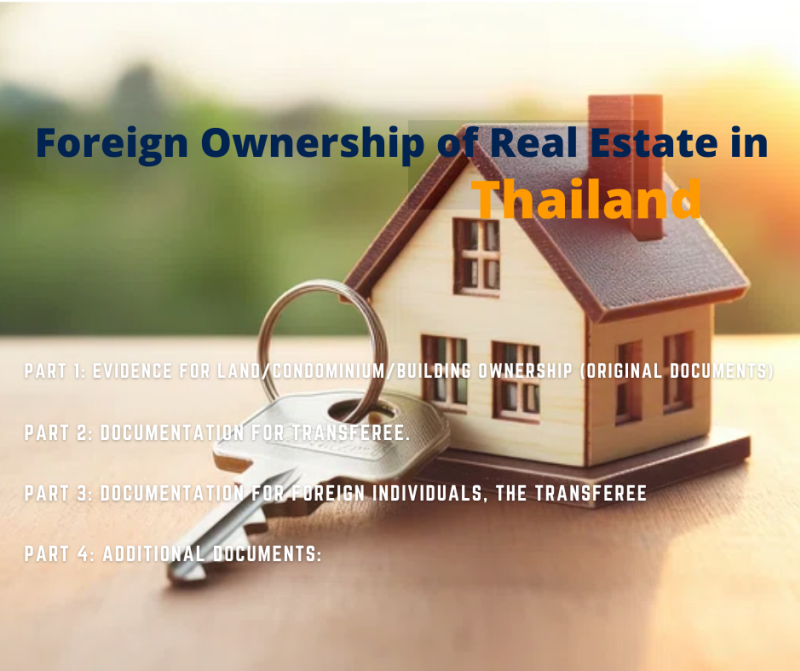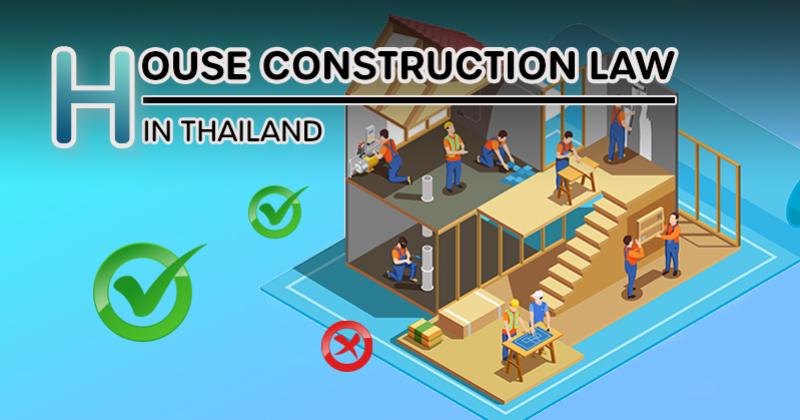
Created : 29 Jan 2024
Updated : 29 Jan 2024
Foreign Ownership of Real Estate in Thailand - Documents required for registration
Part 1: Evidence for Land/Condominium/Building Ownership (Original Documents) includes the following:
Part 2: Documentation for Transferee, including:
For Individuals:
1.National Identification Card
2.Copy of Household Registration
3.Name/Last Name Change Certificate (if applicable)
4.Marriage Certificate (if applicable)
5.Spouse's Death Certificate (if applicable)
6.Divorce Certificate/Record of Divorce (if applicable)
7.Letter of Consent for the transaction from the spouse, along with their National Identification Card and copy of
8. Household Registration.
In the case of a transfer according to Section 13 of the Land Code, the documentation includes:
1.Death Certificate or proof of the decease of the heir.
2.Original Last Will and Testament (if available).
3.Copy of the Last Will and Testament that has been presented to government agencies such as the court or other land offices, certified as a true copy by the authorized personnel of that agency (in case the original document is lost or destroyed).
4.National Identification Card and copy of Household Registration of the executor of the will (if applicable).
5.Name/Last Name Change Certificate of the heir and the executor (if applicable).
For Legal Entities:
1.Certificate of Incorporation.
2.Corporate Meeting Minutes.
3.Specimen signature of the authorized signatory or the person with the power to represent the legal entity.
4.National Identification Card and copy of Household Registration of the directors or authorized representatives of the
5. legal entity, along with their official stamp.
6.Articles of Association and Objectives.
7.Corporate Regulations.
8.List of Shareholders.
Part 3: Documentation for Foreign Individuals, the Transferee:
Documentation related to Foreign Individuals:
1.Certificate of Residence issued by the local police station where the foreign individual resides.
2.Passport showing the nationality of the foreign individual.
3.Certification from government officials, police officers, or the embassy/consulate to which the individual is affiliated.
4.Emergency certificate issued by the Ministry of Foreign Affairs temporarily indicating nationality.
5.Copy of the Household Registration of the applicant and all individuals listed in the same household registration (if applicable).
6.Marriage Certificate (in the case of applying for inheritance as a spouse).
7.Marriage Certificate between the biological parents of the heir (in the case of applying for inheritance as a child).
8.Documentation of the registration of being the adopted child (in the case of the applicant being an adopted child of the heir).
Source of Investment Funds:
1.Evidence of foreign currency brought into the kingdom.
2.Proof of funds transfer from a foreign currency deposit account.
3.Evidence of withdrawal from a Thai Baht account of a person residing abroad for investment purposes (the source of investment funds can be supported by one or more of the following points, but the total amount must be at least 40 million Baht):
a. Proof of funds transfer from abroad.
b. Proof of funds transfer from a foreign currency deposit account.
c. Proof of sale of assets abroad.
d. Other relevant evidence of funds from abroad.
Part 4: Additional Documents:
1.Court order or appointment decree appointing the heir as the estate manager (if applicable).
2.Documents presented to officials, if in a foreign language, must be translated into Thai and certified as accurate.
3.Certification of debt exemption from a condominium juristic person (in the case of transferring a condominium unit).
4.Certification from the condominium juristic person confirming that a foreigner holds ownership rights to the unit not exceeding 49% of the total area of all units in that condominium building (in the case of transferring a condominium unit).
5.In cases where power of attorney is granted for the transaction, there must be a power of attorney document, along with the national identification card or a copy of the national identification card and copy of household registration (authenticated) of the person granting the power of attorney, along with the national identification card and copy of household registration (original) of the authorized person.
Today, our page is presenting information about Foreign Ownership of Real Estate in Thailand - Documents required for registration, hoping that it will be beneficial for all of you who come here to read. Additionally, The Property Center page also has many other great articles that you can read. If any of you are looking to find a house or other real estate, you can entrust your property to us for sale. We have clients contacting us every day, and we will professionally handle the work on your behalf. The Property Center warmly welcomes all homeowners. We have a team that posts on various online media platforms and creates advertisements in newspapers and marketplaces. These services are free, and we only charge a commission fee of 3-5%. Please contact us promptly.
Thank you for the information from
https://www.thailand.go.th/issue-focus-detail/010_011?hl=th

